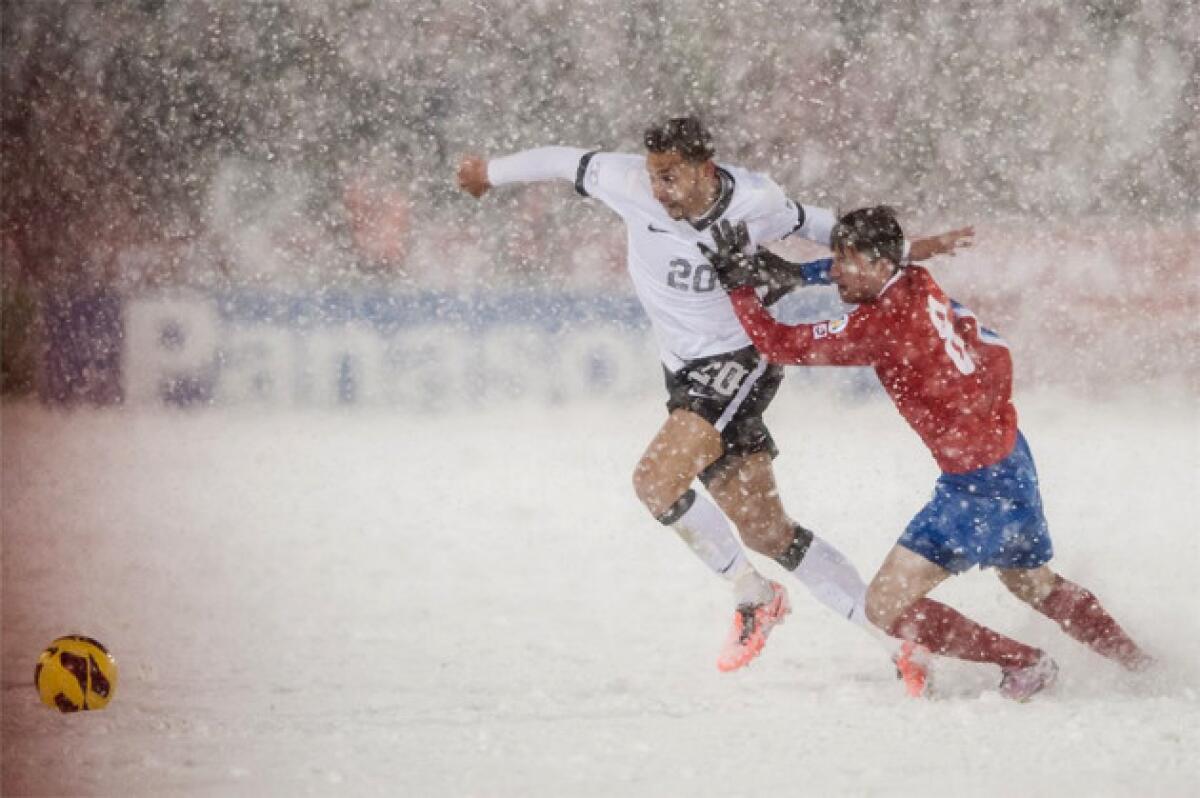U.S. has answers for Rocky Mountain why

MEXICO CITY — They scheduled a World Cup qualifier for the plains north of Denver on Friday.
What they got instead was a new Winter X Games sport. And though we’re not sure what to call it yet, we know what it shouldn’t be called: soccer.
By the time the U.S. finished off its 1-0 victory over Costa Rica, players on both teams were plowing through ankle-deep slush chasing after a yellow ball that, more often than not, seemed to get caught up in snow drifts. Well-struck crosses thudded quickly to earth, well-timed passes stopped far short of their intended targets and grounds crew members, shovels in hand, repeatedly rushed the field during play to uncover the touch lines, the penalty area and the center circle.
This wasn’t the beautiful game. It was the Iditarod without the dogs. And it never should have been allowed to finish.
But it was. And because of that, Coach Juergen Klinsmann is suddenly riding a much-needed avalanche of momentum into Tuesday’s qualifier in Mexico City.
A week ago Klinsmann and the U.S. stood last among the six nations in the hexagonal round of qualifying, the only team without a point. After putting Costa Rica on ice, though, the Americans are now second, ahead of even unbeaten Mexico.
A week ago Klinsmann was trying to fill a roster from a player pool devastated by injuries, with four starters from last month’s qualifying opener suddenly unavailable. And then there was the discontent in the locker room, with nearly a dozen players anonymously questioning everything from the coach’s tactics and personnel decisions to his game management and the team’s chemistry.
Now that’s all been buried under a half-foot of snow — only to be replaced by a new controversy over why common sense was suspended Friday but the game wasn’t.
“Honestly, it was robbery, a disgrace, I’ve never played a game in these conditions,” Costa Rican midfielder Cristian Bolanos, who plays with Danish club FC Copenhagen, told Reuters. “You couldn’t see the ball ... if we had played without snow, we would have won, I am sure.”
Whether Bolanos is right or not will never been known, which is kind of the point. Did Costa Rica lose to the U.S. or the elements?
Sure, the Americans had to deal with the same blizzard conditions and they were able to make Clint Dempsey’s first-half goal — which came after the yellow ball took a fortuitous bounce off Costa Rican defender Roy Miller — stand up. Unquestionably, they displayed tremendous grit and determination in difficult conditions.
But winning the winter carnival shouldn’t get you three important points in the final round of World Cup qualifying. Which is why Costa Rican officials planned Saturday to lodge an official protest with FIFA, world soccer’s governing body, arguing that referee Joel Aguilar of El Salvador and match commissioner Victor Daniel of Grenada should have suspended the game shortly after the intermission when the already-unplayable conditions began to deteriorate rapidly.
Officials even stopped play briefly 10 minutes into the second half, apparently to consider halting the match. But after some frantic lobbying from Klinsmann, play resumed.
“I would have done anything kind of possible not to stop,” Klinsmann said. “I mean you start it off, you score a first goal….you want to keep that advantage and finish it off.”
According to U.S. Soccer Federation President Sunil Gulati, suspending the game would have required both teams to resume play at the point of stoppage when the weather cleared. But with snow and sub-freezing temperatures forecast for much of the weekend, a suspension could have caused scheduling nightmares, because both countries have qualifiers scheduled for Tuesday — the U.S. in Mexico City and Costa Rica at home against Jamaica.
“The referee and match commissioner made the decision that the game could continue and I think it was the right decision,” Gulati said.
So why did U.S. Soccer schedule a World Cup qualifier for suburban Denver in March, when snow is hardly uncommon?
That has more to do with the Americans’ next opponent than it does with their last one. Training for four days at altitude, then playing in Colorado’s rarefied air was deemed suitable preparation for Tuesday’s match at Mexico City’s 7,300-foot elevation. (Preparation has it limits, though, because after playing in a blizzard the U.S. team is expected to arrive in Mexico City on Sunday, where the forecast calls for a high of 82 degrees.)
And let’s face it, Mexico is the team the U.S. — and Klinsmann — has been pointing for. Not only is Mexico 68-1-6 in World Cup qualifying at Azteca Stadium — that lone loss coming to Costa Rica a dozen years ago — but El Tri hasn’t lost a World Cup qualifier anywhere since June 2009.
That’s not to say they never lose, though. Just last August, with a 1-0 win in a friendly at Azteca, Klinsmann became the first U.S. coach in history to beat Mexico in Mexico. It was an event some here considered as likely as hell freezing over.
But then, as the Costa Ricans will tell you, Klinsmann seems to be at his best in cold weather.
Twitter: @kbaxter11







